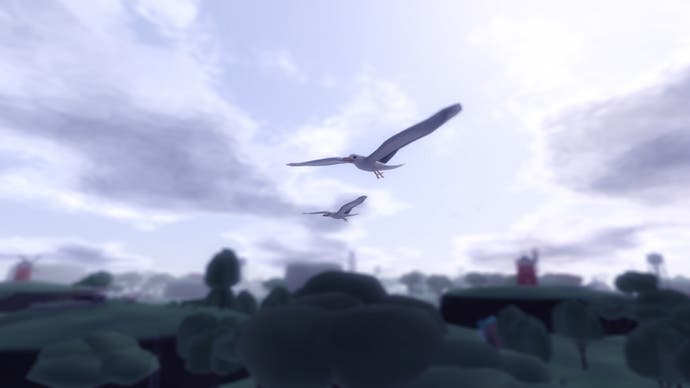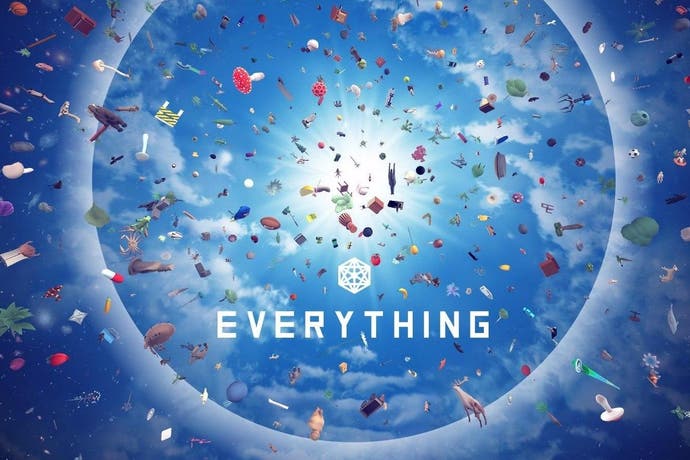Everything is the most ambitious catalogue of things ever committed to a video game
The Earth and everything in it.
You start life as a cartwheeling moose. As leading protagonists go, it's a bold casting. A moose, it turns out, can do very little, at least, very little here in Everything's deep and vast world. You move in a staccato, tumbling motion at one of two speeds, pausing only to converse with any nearby animals, rocks and plants over which a speech bubble hovers. "I don't know if I'll make it through the spring," says an anxious sapling. All you can do to reassure the plant is moo a big moosey moo, then flip-flop off on your way.
There's an absurdist, comic charm to this combination of movement and mad mumbling, something that you might expect from a game built by David O'Reilly the Irish artist and filmmaker best known for the surreal Adventure Time episode, A Glitch is a Glitch. First impressions, however, mislead. Everything is not a game that's playing for laughs. Rather, it's a game that's seeking to explore the fundamental questions of existence and - holy hell - it makes it further than most.
Everything's universe is, like Minecraft's, procedurally arranged. Soon enough, after roaming the misty landscape for a while, you gain the ability to depart from your moose by ghoulishly possessing another, smaller animal, vegetable or mineral. Line up the reticule and with the press of a button you are no longer a moose, but a monkey, or an apple, or a frog, running, rolling or hopping across the world. After a few moments, this new creature is added to the game's yawning encyclopaedia, where it's classified according to type. Once collected you can, at any time, reassume its form.
At first, you can only inhabit ever-smaller entities. One you're a worm, for example, you can become a stone, but not a fox. You can delve only into ever-tinier forms, from bugs, bacteria, all the way down into the atomic strata of life. At each stage, your perspective on the world shifts, as you simultaneously fill in new blanks in the encyclopaedia. Reach the sub-atomic level and you are, at last, permitted to leap back up the chain, becoming an atom of nitrogen, perhaps, then a caterpillar, then a beech tree, then, as the camera pulls back, a continent, a planet, a sun, a star system.
In this neck-whipping journey from the microscopic to the macroscopic (in one moment you're so small that, as in Honey, I Shrunk the Kids, a pine cone seems as tall as a skyscraper; the next moment an entire galaxy is viewed like a purse filled with diamonds, spilled onto a dining table), the game's unstated goal is revealed: gotta catch 'em all. Filling in the blanks is a major undertaking. While Minecraft's world is rather barren (if rich in minerals) Everything's world teems with life and structure at every imaginable scale. As well as categories of space debris, fruit, and megafauna, there are human-made artefacts to possess: arrows, yurts, campfires, French horns, fax machines. Everything is perhaps the most ambitious catalogue of things that has ever been committed to a video game.
In Katamari Damacy, Keita Takahashi's absurdist masterwork, players were tasked with similarly collecting objects in the world at growing scale. There you rolled an adhesive ball, collecting natural and human made debris to form a giant orb that was, in the final instance, fired into space. Katamari Damacy was a game about de-cluttering the world, ridding it of garbage in order to return it to some earlier, purer form. Everything's similar approach is used to deliver a contrary message. As you explore the world you encounter audio recordings of a lecture delivered by the British philosopher Alan Watts that can be played over the top of your activity. Each snippet, which lasts for a minute or so, is discovered and played in sequence over the course of the game, and works to clarify Everything's message.

In the lecture, Watts unstitches our prevailing "common sense" that we are individuals, separate from the physical world. "We have been brought up not to feel as though we belong in the world," he says, in one clip. "We say: 'I came into the world.' In fact, you were born our of it." Watts, who gave lectures at esteemed American universities throughout the 1960s, prior to his death in 1973, and who was gifted with a gravelly, lullaby voice, instead argues that all things are connected. In fact, he goes as far as to say that there are no 'things' at all: the universe is, rather, one stream of interconnected atoms.
Watts wants us to overcome the illusion, that, as he puts it in one of the final segments of his lecture, space separates things. "[There is no] interval between objects, between birth and death," he says. It's a transcendental message, one that, despite being firmly rooted in orthodox Eastern philosophy, has the whiff of mid-twentieth century Californian hippydom. But when combined with O'Reilly's freeform, mesmerising game system and the lilting, meditative soundtrack, Watts' message becomes unusually affecting, perhaps even transformative.
In part, that's because, in the post-Brexit vote, Trump era, Watts' message of oneness and unification feels urgent and radical. "If we do not feel connected, as though we are identical with the universe, rather than apart from it, then we will commit collective suicide," Watts, says. Speaking in the mid-20th century, for Watts that looming threat was the Atom bomb. In the early 21st Century context, that particular inextinguishable threat remains, but it's combined with a new catastrophe, climate change, a sickness brought on by the industrialisation of individualism. Everything's simple yet revelatory trick is to show how all things are connected, through space and time, through that fundamental power of all video games: the capacity to inhabit the form of another.
If you feel sceptical about your ability to feel empathy with a raspberry, or to experience solidarity with a strand of hair, or to be moved by performing a dance with a shoal of fish, you may be surprised. Everything casts a powerful spell through its combination of speech, music and reality expanding interaction. It may present a deeply simplified version of our world (it was, after all, made by a tiny team) but Everything is an astonishing work, one that broadens the definition of what a video game can be, as well as, if one is willing to submit to that spell being cast, what a video game can achieve in the mind of its player.
Everything is out now on PlayStation 4, with PC and Mac versions coming next month


